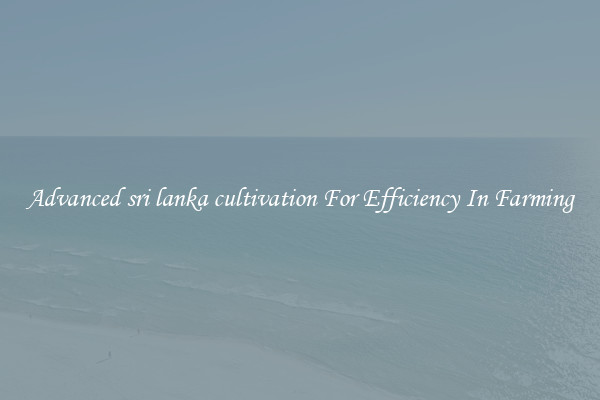Advanced sri lanka cultivation For Efficiency In Farming
Advanced Sri Lanka Cultivation for Efficiency in Farming

Sri Lanka, often hailed as the "Pearl of the Indian Ocean," is renowned for its rich biodiversity and fertile agricultural lands. Agriculture plays a vital role in the country's economy, employing a significant portion of the population and contributing to both local food security and export revenues. To ensure sustainable growth and meet the increasing demand for quality produce, advanced cultivation methods have become crucial in enhancing efficiency in farming across the island.
One of the key aspects of advanced farming in Sri Lanka is the adoption of modern technology. Agricultural practices are being revolutionized by the use of innovative tools and equipment that help farmers optimize their productivity. For example, smart irrigation systems enable farmers to monitor and control water usage, reducing wastage and ensuring optimal irrigation for crops. Moreover, the integration of precision agriculture techniques allows for precise fertilization, pest control, and crop monitoring, resulting in higher yields and reduced input costs.
In addition to technological advancements, Sri Lankan farmers are also embracing sustainable cultivation practices. Sustainable agriculture aims to minimize the negative impact on the environment while maximizing productivity. This includes the adoption of organic farming techniques, crop rotation, and integrated pest management strategies. By avoiding the use of harmful pesticides and promoting natural alternatives, farmers can produce healthier and safer crops. In turn, this not only benefits the consumer but also reduces environmental degradation caused by chemical runoff.
Another important aspect of advanced cultivation is the promotion of modern farming techniques and knowledge transfer. Farmers are now receiving training in the latest agricultural practices, empowering them to make informed decisions and adapt to changing farming trends. This knowledge transfer is facilitated through agricultural extension services, government initiatives, and partnerships with academia and research institutions. By equipping farmers with up-to-date information and skills, the efficiency and productivity of farming in Sri Lanka can be significantly improved.
Furthermore, advanced cultivation practices also rely on the integration of modern logistics and supply chain management. Efficient transportation and distribution systems ensure that crops reach the market in a timely manner, reducing spoilage and waste. Additionally, the implementation of quality standards and certifications enhances the marketability of Sri Lankan produce both locally and internationally.
In conclusion, advanced cultivation practices in Sri Lanka are revolutionizing the agricultural sector, enhancing efficiency, and increasing productivity. The adoption of modern technology, sustainable farming techniques, and knowledge transfer have proven to be instrumental in achieving these goals. As the demand for high-quality produce continues to grow, it is essential for farmers and policymakers to continue investing in advanced cultivation methods to ensure a prosperous and sustainable future for Sri Lanka's agricultural sector.

View details

View details

View details

View details







